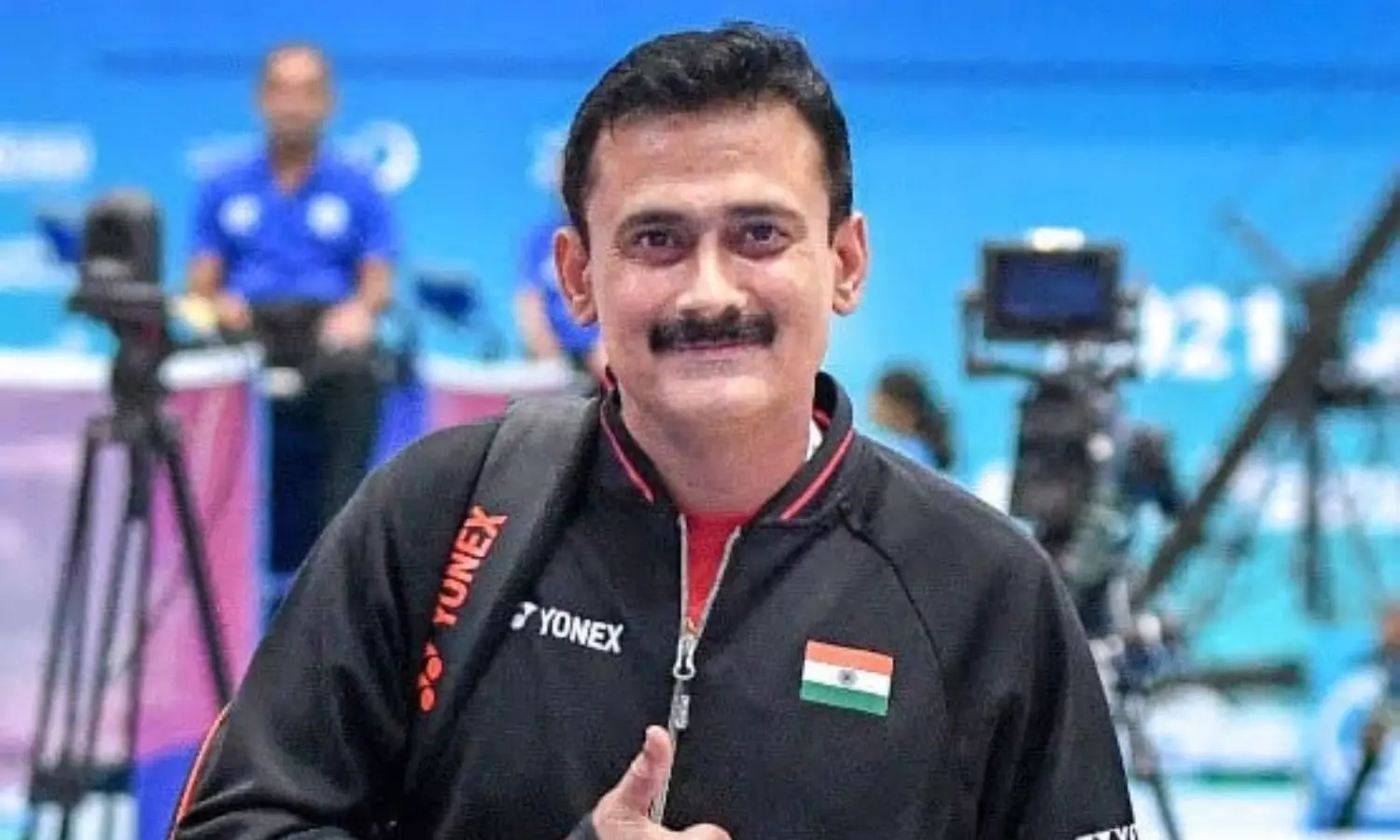Paralympics 2024
'Maintained consistency but didn't achieve target': Para-badminton coach Gaurav Khanna
Although India's para-badminton contingent won five medals - one more than in Tokyo, coach Gaurav Khanna said the ultimate target remained unachieved.

Gaurav Khanna is the head coach of Indian para-badminton team.
Indian para-shuttlers improved their performance at the Paralympics 2024 in Paris, by winning five medals - one more than in the Tokyo 2021.
India's 13-member team brought home a gold, two silver, and two bronze.
Head coach Gaurav Khanna, however, noted that the team's ultimate target remained unachieved, with the focus shifting to reaching greater heights at the Los Angeles Paralympics in 2028.
"Our goal was a bit higher - my target was to win eight to ten medals. In Tokyo, seven para-shuttlers qualified, but this time that number increased to 13. Out of these, five were returning athletes, while eight were new faces. Unfortunately, things didn't go exactly as planned," Khanna told The Bridge in an exclusive interview.
Talking about factors that affected India's chances in Paris, he said, "Some issues, like Indian players facing off against each other, and Palak Kohli's injury before her quarterfinal match, impacted our performance."
"But these are part of the game," said Khanna, adding, "We're happy to have increased our medal count from four to five. This year, India has already won 27, and out of that badminton contributed five. In the Asian Para Games, India won 111 medals, and badminton's contribution was 21. In a way, consistency was maintained."
"At the same time, it was a learning experience for us. We will work on our shortcomings and aim for even greater achievements in Los Angeles (2028 Paralympics)," Khanna noted.
'Nitesh's win big positive'
Despite setbacks and missed chances in the finals, such as Suhas Yathiraj faltering again in the SL4 final to settle for his second consecutive Paralympics silver and Thulasimathi Murugesan losing to China's Yang Qiuxia in the SU5 final, Khanna was elated that Nitesh Kumar successfully defended India's SL3 gold medal, previously won by Pramod Bhagat in Tokyo 2021.
"It's a positive sign that Nitesh defended the SL3 gold after Pramod was suspended. Not having Pramod was a disadvantage for India. But Nitesh never made us feel his absence," said Khanna.
Explaining how Nitesh prevailed over Great Britain's Daniel Bethell in the final, an opponent who defeated the Indian player nine times since they first met, the coach said, "It was their tenth meeting and Nitesh effectively used his prosthetic leg during rallies against Bethell, which helped him regain speed for his jumps. Nitesh also played a patient game. His height also gave him a good reach across the court. By cutting down on mistakes, Nitesh frustrated Bethell and won the match."
Deciphering Suhas' performance, Khanna said conditions were not in his favour in the SL4 final.
"The crowd was against Suhas because Lucas Mazur was the local player. Even though Suhas defeated Mazur at the World Championships four months ago, the drift worked against him as he is a tall player. But I believe he will overcome these mental and physical barriers soon," said the Padma Shri and Dronacharya Award-winning coach.
'Role of technology paramount'
As India's performance in para-badminton remained a mixed bag, Khanna called for more infusion of technology in the sport. He demands precise monitoring of heart rates, mental health analysis, recovery, and BMI (body mass index) of the athletes.
He cited Palak Kohli's experience, who developed a bone tumour in her left ankle after competing in the Tokyo Paralympics, as an example of the need for regular monitoring to prevent overloading players' bodies.
"At the moment we are using technology for certain players to fetch data about their bodies and using that in regular intervals, maybe once in a month or twice. Palak's case was special since she needed regular monitoring. We did that. Otherwise, we would never known about his body condition," said Khanna.
"Yet, we're still way behind in terms of technology used by our rival countries," he emphasised.
"While there was significant advancement and improvement since para-badminton's debut at the Tokyo Paralympics, the increased competition means that the role of technology has become paramount," Khanna added.
"In Nitesh's final as well, we noticed that British player Bethell was wearing a chip on his T-shirt that helped his coaches map his jumps, agility, and speed. We also need to have a similar approach to the game," he said.
Wheelchair badminton in focus for LA 28
Khanna also stressed a missing spot. "We were ranked World No. 7 in wheelchair discipline, but only six players were taken for the Paralympics, so we missed out on a spot by just one place. Had we qualified in this event, it would have been historic," said Khanna.
"The wheelchair game is technology-driven, and the wheelchairs we're using - its weight, the centre of gravity, and the material - in India aren't as good as those of our opponents. Technology is playing a very important role in this discipline," he added.
"In the new cycle (2024-28), my focus will be on wheelchair athletes. I've already started a talent hunt program, and yesterday, seven young athletes attended the program," apprised Khanna.
Streamlining India's future
Looking ahead, Khanna, who has been at the helm of the national team since 2015, is focused on streamlining India's next generation of talent.
"I'm looking for youngsters under 10 or 12 years old to prepare them for the 2028, 2032, or 2036 Paralympics," he said.
Khanna also noted the growth of para-badminton in India.
"The total number of players in India has risen to 1,200. We have built a database of all these players. When I started coaching, we had just 60 players, and some categories like that of Manasi Joshi and Parul Parmar had only one or two players. But this year, at the national championship in Jharkhand in March, we had over 700 participants," stated Khanna, who runs the world's only dedicated para-badminton academy in Lucknow.

